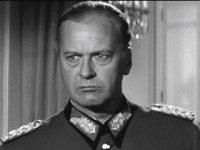Poppo
In the Cooler
- Joined
- Mar 17, 2012
- Messages
- 3,457
In films like " Valkirie" and in german politic celebrations, Von Stauffenberg is considered an almost ethic, moral figure against Hitler' s crimes. Actually , it is not really like this....Stauffenberg is a typical example, like Rommel and many other generals of the Whermacht military "caste". These people had been so glad when Hitler rearmed germany from the mid 30ies and promised them honours and power; glad also when Hitler killed Rhom and all the SA chiefs ( SA were strong enemies of german generals). They were also excited at the start of the war and finally most of them collaborated without the slight moral problem with SS and "einsatz gruppen" who exterminated a large part of civil population in the east..The problems started with war against Russia and especially when the war was going to be lost. Stauffenberg and other generals then wanted to kill Hitler, and give the power to....Themselves! Make peace and save the most conquerred lands they had got. They did this in 1944!! We can t speak of ethic or moral values...We can only speak of braveness, yes, Stauffenbeg was very brave! But the real ethic heros in Germany were surely not the generals who killed civils, russian prisoners, agreed with deportations and so on !!!!
The real ethic heros of Germany were some young univeristy students :Hans and Sophie Scholl and the group of " the white rose" a non violent catholic movement in Munich who atttack the nazis violence by preparing and distributing six leaflets( 1942-43), and were beheaded for this...
Also the brave bishop of Munster ,Graf von Galen,who protested from his church against the nazi crimes of gestapo and the program " eutanasia".
Let' s remember these civil heros like an example for the human race of tolerance, peace, and civil rebellion againt brutality, and let' s leave the german generals to historic and politic considerations.
The real ethic heros of Germany were some young univeristy students :Hans and Sophie Scholl and the group of " the white rose" a non violent catholic movement in Munich who atttack the nazis violence by preparing and distributing six leaflets( 1942-43), and were beheaded for this...
Also the brave bishop of Munster ,Graf von Galen,who protested from his church against the nazi crimes of gestapo and the program " eutanasia".
Let' s remember these civil heros like an example for the human race of tolerance, peace, and civil rebellion againt brutality, and let' s leave the german generals to historic and politic considerations.






